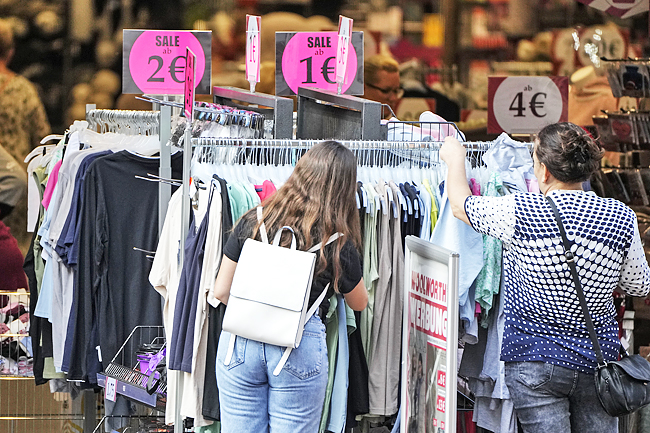FRANKFURT (AP) – Inflation that has plagued Europeans declined sharply in September to the lowest level in two years, strengthening hopes that consumers will get relief from costlier groceries, vacations and haircuts – and that the European Central Bank (ECB) won’t have to further restrict the economy by raising interest rates from already-record highs.
The annual rate was 4.3 per cent this month, a drop from 5.2 per cent in August, and the lowest since October 2021, the European Union’s statistics agency, Eurostat, said on Friday.
But recently higher oil prices are casting a shadow over prospects for quickly beating inflation down to the central bank’s target of two per cent.
Core inflation, which excludes volatile fuel and food prices, fell more than analysts expected – to 4.5 per cent from 5.3 per cent. The ECB closely watched the figure to assess how inflation is coming down. “The fall in core inflation “reinforces our view that the ECB has finished raising interest rates”, said Deputy Chief EurozoneEconomist at Capital Economics Jack Allen-Reynolds. He predicted that the overall inflation rate would tumble to 3.5 per cent by the end of the year.
While inflation is lower in the United States (US), a measure closely tracked by the Federal Reserve (Fed) accelerated in August to 3.5 per cent compared with a year earlier, from 3.4 per cent in July, boosted mainly by higher gasoline prices.
Meanwhile, eurozone energy prices dropped 4.7 per cent in September, while food price inflation remained uncomfortably high at 8.8 per cent. Readings across the major economies that use the euro currency were a mixed bag.

Germany’s annual inflation fell to 4.3 per cent in September from 6.4 per cent a month earlier, while Spain’s increased to 3.2 per cent from 2.4 per cent.
Economists warn, however, that the large drop in Germany, the 20-country eurozone’s largest economy, was exaggerated by a statistical quirk – the end of a subsidised transportation ticket and a fuel subsidy in September 2022 that had raised consumer prices that month.
The latest inflation figures follow what may have been the final interest rate increase by the ECB in its swift series of hikes.
It brought its benchmark deposit rate to a record high of four per cent this month, up from minus 0.5 per cent in July 2022.
ECB President Christine Lagarde said that if interest rate levels are maintained for a sufficiently long duration, that would make a substantial contribution to returning inflation to two per cent, a goal the bank does not expect to reach until 2025.
High prices have been holding back the European economy because people’s pay cheques don’t go as far as they used to in covering their bills, forcing them to cut back on other spending.
Economic growth has stagnated to just above zero in the first six months of the year, with some indicators pointing to a downturn in the current July-to-September quarter.
This burst of inflation was set off as the global economy rebounded from the COVID-19 pandemic, leading to shortages of parts and raw materials.
Supply chain bottlenecks and energy prices have eased, but inflation has worked its way through the economy.


